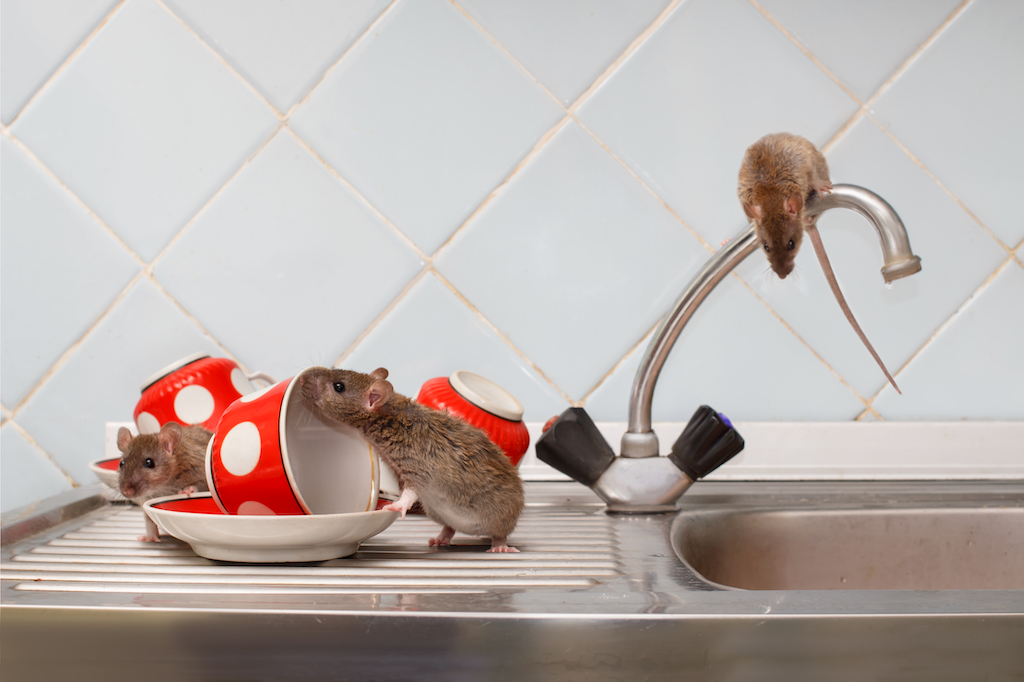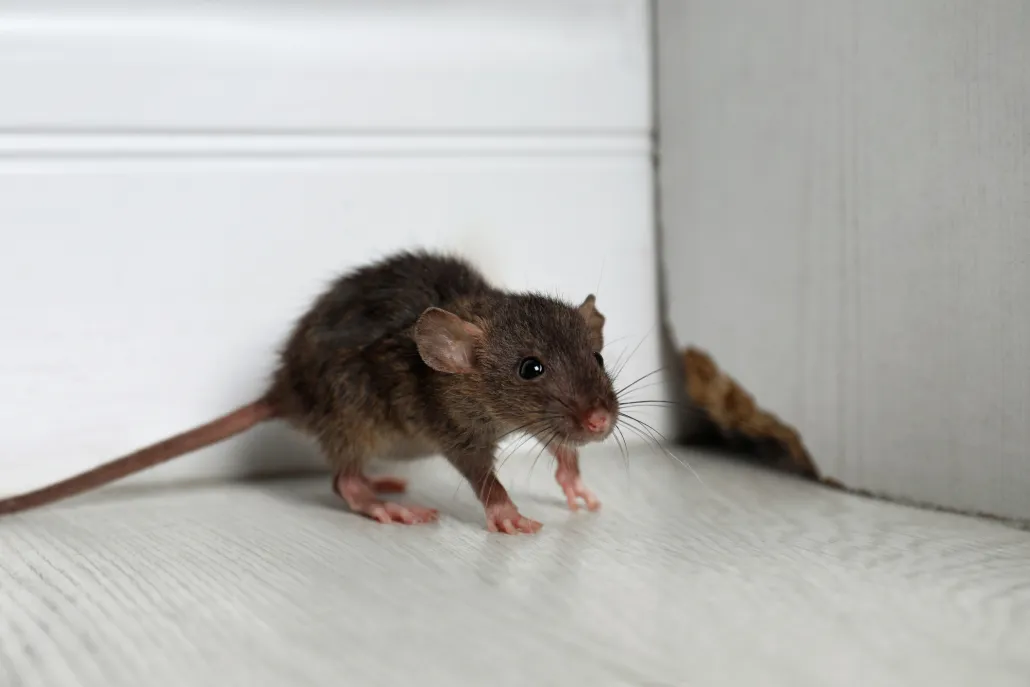Rat Control and Exclusion in The Villages, Florida, Pest Control Xperts
If you hear heavy scratching or thumping noises in your attic at night, you are likely dealing with one of Central Florida’s most persistent pests: the Roof Rat. In The Villages and Lady Lake, these agile climbers thrive in our landscaping, feeding on citrus trees and nesting in palm skirts before finding a way into your home. Pest Control Xperts provides specialized rat control and exclusion services designed to evict these unwanted guests and seal them out for good. We understand the construction of local homes, from the roof vents of Designer models to the soffit returns on Premier estates. Our local team uses safe pest management practices to protect your wiring, insulation, and health from these destructive rodents.
Rat Problems We Solve in The Villages
Rats are significantly larger and more destructive than mice. In our area, the Roof Rat (also known as the Fruit Rat) is the primary culprit. They spend most of their time off the ground, using fences, power lines, and tree branches as highways to access your roof. Once they breach the attic, they can chew through PVC piping, destroy ductwork, and gnaw on electrical wires, creating a serious fire hazard.
Our approach involves more than just setting traps. We focus on “exclusion,” which means physically altering your home to make it impenetrable to rats. We use pest tracking to identify their entry points and travel paths. By addressing the exterior vulnerabilities and the interior infestation simultaneously, we provide a complete solution. We do not just catch the rats; we ensure your home is no longer a target.
Common signs of a rat issue:
- Loud scratching, gnawing, or running sounds in the ceiling at night
- Large droppings (about the size of an olive pit) found in the attic or garage
- Smudge marks (sebum/grease) along rafters, pipes, or walls
- Hollowed-out oranges, grapefruit, or lemons in your garden
- Chewed holes in soffits, eaves, or roof vents
- Insulation that has been trampled down or gathered into nests
- Pet dogs barking or staring at the ceiling or a specific wall
- A distinct, musky ammonia odor in the attic or storage areas

Types of Rat Issues We Handle
Roof Rat infestation in attics
Roof Rats are experts at finding the gap between the roof decking and the fascia board. Once inside the attic, they have a safe, warm environment to breed. They often use the insulation for nesting material. Because they are nocturnal and stay high up, you may never see one on the ground floor, but the damage they cause above your head can be extensive. We specialize in attic trapping programs that remove the population safely without leaving odors behind.
What we look for during inspection:
- Light gaps visible from inside the attic
- Gnaw marks on A/C ducting or electrical wires
- Rat runs (paths) in the blown-in insulation
- Rub marks on roof vents and ridges
Rats in pool heaters and lanais
It is not uncommon for rats to nest inside pool heaters or behind outdoor kitchen cabinets on the lanai. The warmth and protection make these areas ideal for nesting. Rats can chew through the wiring of expensive pool equipment, leading to costly repairs. We provide specialized rodent barrier installation for outdoor equipment to protect your amenities.
What we look for during inspection:
- Nesting material inside pool pump housings
- Chewed wires on outdoor grills or fridges
- Droppings around the pool equipment pad
- Burrows under the concrete slab of the lanai
Exterior population control and fruit rats
The abundance of fruit trees in The Villages acts as a magnet for rats. Even if they are not in your house yet, a high population in your yard increases the risk of entry. Rats will strip a citrus tree of fruit in a few nights. We help manage the exterior pressure through pest deterrent strategies and environmental changes, reducing the likelihood that they will make the jump from the tree to your house.
What we look for during inspection:
- Hollowed out fruit on the ground
- Nests in the crown of palm trees
- Grease marks on fences or power lines
- Overgrown vegetation touching the home

Our Rat Inspection and Exclusion Approach
At Pest Control Xperts, we view rat control as a construction project as much as a pest control service. Our pest assessment begins on the roof. We inspect ridges, returns, vents, and stacks. We know that a rat can squeeze through a hole the size of a quarter, so we look for even the smallest weaknesses.
Once we identify the entry points, we perform comprehensive exclusion techniques for pests. We use durable materials like galvanized steel mesh, heavy-gauge hardware cloth, and concrete to seal the home. We do not use expanding foam alone, as rats can easily chew through it. While we seal the home, we implement a trapping strategy to remove the rats currently inside. We use snap traps or sanitary containment traps placed in travel paths. We typically avoid using rodenticides inside the attic to prevent rats from dying in inaccessible walls, which creates secondary odor and fly problems. Our goal is safe pest management that solves the issue permanently.

Rat Prevention and Pest Proofing Tips for The Villages Homes
You can significantly lower your risk of a rat infestation by managing the environment around your home. Since Roof Rats are climbers, your landscaping choices play a huge role in whether they target your property. Our team provides property pest management advice tailored to the lush landscape of Central Florida.
Preventative steps that actually help:
- Trim tree branches back at least 6 to 8 feet from the roofline
- Install metal rodent guards on palm tree trunks to stop climbing
- Harvest citrus fruit as soon as it is ripe and pick up fallen fruit daily
- Keep bird feeders away from the house (or remove them if rats are active)
- Keep palm skirts trimmed tight to remove nesting spots
- Ensure roof return vents are screened with heavy hardware cloth
- Seal openings around A/C line sets and utility pipes
- Keep outdoor trash cans sealed with tight-fitting lids
- Do not leave pet food outside after dark
We can also assist with installing pest detection systems in your attic to alert you to early activity before it becomes a full-blown infestation.
Residential and Commercial Rat Control
We protect both private residences and commercial properties in Lady Lake and The Villages. For homeowners, our residential bug removal and rodent services focus on protecting your peace of mind and your property value. We work cleanly and respect your home during the exclusion process.
For commercial businesses, such as restaurants and warehouses, rats are a severe liability. We provide commercial pest services that focus on the exterior perimeter to stop rats before they enter loading docks or waste areas. We offer discreet service and detailed documentation for health inspectors. Our integrated pest management plans help business owners maintain a sanitary environment without relying solely on toxic baits.
Professional Rat Extermination vs DIY Methods
Dealing with rats is dangerous. They can be aggressive when cornered and carry diseases like Leptospirosis and Hantavirus. DIY attempts often fail because homeowners seal the holes *after* the rats are inside, trapping them in the walls, or they use poison that endangers local wildlife like owls and hawks. “Throw packs” of poison often end up being moved by the rats into places where pets can reach them.
Professional pest exterminators understand rat behavior. We know how to pre-bait traps to gain the rats’ trust before setting them. We have the proper safety equipment to work in attics where insulation may be contaminated. Most importantly, we have the tools to perform exclusion work on the roof safely. Investing in professional rat control ensures that the entire colony is removed and the home is sealed correctly, preventing the cycle from repeating.
Frequently Asked Questions About Rat Control
What is the difference between a mouse and a rat?
Rats are much larger than mice. An adult Roof Rat can be 12-14 inches long (including tail), while a mouse is 2-4 inches. Rats leave larger droppings and cause more aggressive damage, such as chewing through pipes and wood. Mice tend to stick to the kitchen; rats prefer the attic.
How do you get rats out of the attic?
We use a trapping and removal process. We place traps along their active runways in the attic. We monitor these traps regularly until the population is depleted. Simultaneously, we seal the entry points so no new rats can enter.
Will the rats die in my walls?
This is the main risk of using poison. If you poison a rat, you cannot control where it dies. That is why we prefer trapping. It allows us to remove the carcass from the property, preventing odor and sanitation issues.
How do rats get on the roof?
Roof Rats are excellent climbers. They can climb rough stucco walls, brick, and drain pipes. They also jump from nearby tree limbs or run along power lines that connect to your house.
Rat control in The Villages and nearby areas?
Yes, we provide specialized rat control and exclusion services to The Villages, Lady Lake, Fruitland Park, and surrounding areas. We are experts in handling the Roof Rat population that thrives in our area.
Do you offer green pest control options for rats?
Yes, exclusion (sealing the home) and mechanical trapping are chemical-free methods. We focus on physical barriers to solve the problem, which is the most environmentally friendly and long-term solution available.
Is there a local rat exterminator near me?
Yes, Pest Control Xperts is your local specialist. We are nearby in Lady Lake and can respond quickly to assess your rodent issue.
Can rats chew through concrete?
Rats cannot chew through solid cured concrete, but they can chew through uncured concrete, mortar, plastic, wood, aluminum, and even soft lead. That is why we use steel and hardware cloth for all repairs.
Service Area for Rat Control in and Around The Villages, Florida
We are dedicated to keeping the homes of Central Florida safe from rodents. Our technicians are frequently in the neighborhoods of The Villages, helping residents protect their attics and lanais. We also serve the surrounding rural areas where rodent pressure can be high. Local service means we understand the specific challenges of our environment.
- The Villages
- Lady Lake
- Fruitland Park
- Wildwood
- Oxford
- Summerfield
- Leesburg
- Weirsdale
We are dedicated to providing reliable, effective pest control to every zip code we serve.
Zip codes we serve: 32159, 32162, 32163
Conclusion
Rats are smart, destructive, and dangerous to your home’s infrastructure. Pest Control Xperts brings the construction knowledge and pest control expertise needed to defeat them. Whether you are hearing noises in the attic or seeing activity in your fruit trees, our team in The Villages is ready to secure your home. Do not let rats make themselves comfortable in your attic.
Contact us today to schedule your inspection and exclusion service.
